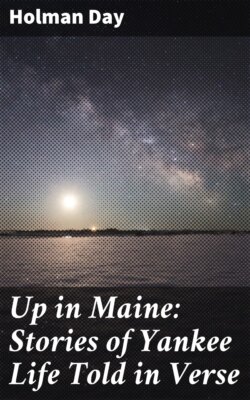Читать книгу Up in Maine: Stories of Yankee Life Told in Verse - Holman Day - Страница 18
На сайте Литреса книга снята с продажи.
HOSKINS’S COW
ОглавлениеTable of Contents
Hoskins’s cow got into the pound and the notice
was tacked on the meetin’-house door:
“Come into my yard, one brindle cow with three
white feet, and her shoulders sore,
—Galled by a poke—and the owner is asked
to call at the pound and take her away.”
Well, Hoskins knew she was his all right, but,
you see, he hadn’t wherewith to pay.
The cow was breachy—she wasn’t to blame,
for Hoskins had turned her abroad to roam;
She had to battle for daily grass, for the bovine
cupboard was bare at home.
So Hoskins had hitched on her withered neck a
wooden “regalia”—sort of a yoke,
Supposed to keep her from breachy tricks, but
the poor old creature employed the “poke”
To rip up fences and let down bars; her hunger
sharpened her slender wits,
And somehow she sneaked through the guarded
gates, and gave the garden sass regular fits.
The neighbors pitied her starving state, but at
last she stubbornly wouldn’t shoo;
They pounded tattoos on her skinny ribs till it
really seemed they would whack ’em through.
But she got so toughened and callous and hard,
and the stiffened frame of her mortised bones
Formed such an excellent armor-plate against
the broadsides of sticks and stones,
That they “pounded” her then in a different
way—in the village pound—whose walls
would hold
The breachiest cow that ever strayed—and the
notice was posted as I have told.
She stood there a day and she stayed there a
night; she cropped the scanty bushes and
grass,
And moo-ed and loo-ed in a yearning way, when-
ever a person chanced to pass.
—She ate the leaves from some alder sprouts
for a scanty breakfast the second day,
And munched the twigs for her dinner, alas,
and longed, oh, so much, for some meadow
hay.
That night she gnawed at her dry old poke—
a painful meal, for the slivers ran
In her tongue; so she crouched by the high-
barred gate and seemed deserted of God and
man.
And Hoskins knew that they had his cow, and
Hoskins knew of her solemn fast,
For he’d gone up the highway and looked
through the gate in her dumb, reproachful eyes
as he passed.
Yet what, may I ask, could the poor man do?
He was right in a place where he couldn’t
Pay,
—He had three dollars, ’tis true enough,
and ’twould square the bill, but, you see, that day
The catchers had come and taken his dogs: a
hound, a setter, and brindle-pup,
And a man like Hoskins would ne ’er endure to
have the dog-pound gobble them up,
For he gunned on Sundays behind the hound,
and the bull was entered and backed to fight.
And Hoskins, you see, as a sporting man had a
reputation to keep upright.
I wonder, friends, if you’ve ever thought, while
you’ve stormed at rum as the poor man’s curse,
There are chaps so built on the mental plan that
keeping dogs will warp them worse?
The “dog” man may be reclaimed, but I’ve
been compelled, alas, to see
That there doesn’t appear to be much hope for
the wretched critter condemned to three.
And Hoskins’s duty was plain to him: his
youngsters wailed for the milk they missed,
But Hoskins thought of his poor, poor dogs and
gripped his dollars tight in his fist.
He shut his ears to his children’s cries, he steeled
his heart when he passed the pound,
To the mute appeal in the old cow’s eyes; but
he smiled at last when his dogs were found.
And he gladly proffered the three lone plunks
to sate the greed of the legal hogs,
And proudly he took the highway back, a-lead-
ing his licensed, bailed-out dogs.
And they barked and yipped and yapped and
yawped at a poor old tottering cow they found
Absorbed in a desperate, hungry reach for a
thistle outside the village pound.
